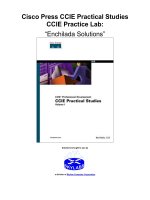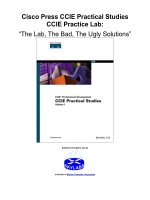Cisco Press 2000 - Voice over IP Fundamentals - Voice over IP Fundamentals
Bạn đang xem bản rút gọn của tài liệu. Xem và tải ngay bản đầy đủ của tài liệu tại đây (176.39 KB, 9 trang )
Voice over IP Fundamentals
Copyright Information
Copyright© 2000 Cisco Press
Cisco Press logo is a trademark of Cisco Systems, Inc.
Published by:
Cisco Press
201 West 103rd Street
Indianapolis, IN 46290 USA
All rights reserved. No part of this book may be reproduced or transmitted in any form
or by any means, electronic or mechanical, including photocopying, recording, or by
any information storage and retrieval system, without written permission from the
publisher, except for the inclusion of brief quotations in a review.
Printed in the United States of America 3 4 5 6 7 8 9 0
Library of Congress Cataloging-in-Publication Number: 99-61716
Warning and Disclaimer
This book is designed to provide information about Voice over IP. Every effort has
been made to make this book as complete and as accurate as possible, but no
warranty or fitness is implied.
The information is provided on an "as is" basis. The authors, Cisco Press, and Cisco
Systems, Inc., shall have neither liability nor responsibility to any person or entity with
respect to any loss or damages arising from the information contained in this book or
from the use of the discs or programs that may accompany it.
The opinions expressed in this book belong to the authors and are not necessarily
those of Cisco Systems, Inc.
Trademark Acknowledgments
All terms mentioned in this book that are known to be trademarks or service marks
have been appropriately capitalized. Cisco Press or Cisco Systems, Inc., cannot
attest to the accuracy of this information. Use of a term in this book should not be
regarded as affecting the validity of any trademark or service mark.
Cisco Systems has more than 200 offices in the following countries.
Addresses, phone numbers, and fax numbers are listed on the Cisco
Connection Online Web site at />.
•
Argentina
•
Australia
2
•
Austria
•
Belgium
•
Brazil
•
Canada
•
Chile
•
China
•
Colombia
•
Costa Rica
•
Croatia
•
Czech Republic
•
Denmark
•
Dubai, UAE
•
Finland
•
France
•
Germany
•
Greece
•
Hong Kong
•
Hungary
•
India
•
Indonesia
•
Ireland
•
Israel
•
Italy
•
Japan
•
Korea
•
Luxembourg
•
Malaysia
•
Mexico
•
The Netherlands
•
New Zealand
•
Norway
•
Peru
•
Philippines
•
Poland
•
Portugal
•
Puerto Rico
•
Romania
•
Russia
•
Saudi Arabia
•
Singapore
•
Slovakia
•
Slovenia
•
South Africa
•
Spain
•
Sweden
•
Switzerland
•
Taiwan
•
Thailand
•
Turkey
•
Ukraine
•
United Kingdom
•
United States
3
•
Venezuela
Dedications
Jonathan Davidson:
Wife, Daughter, Son
To my beautiful wife Shelly for putting up with me during the nights and weekends
spent working on this book. A better wife, mother, and friend could not be asked for.
To my daughter Megan, who will probably be learning data and voice networking in
high school by the time she gets there. Also, my son Ethan, who will probably think
that video and audio conferencing is as common as videogames and VCRs were to
my generation.
James Peters:
To my son Justin, for his curiousity, friendship, and the bond that we share.
To my son Zachary, who has taught me to laugh and to not take life so seriously.
To my daughter Breanna, whose smile makes me realize how beautiful life is.
Voice over IP Fundamentals
Feedback Information
Acknowledgments
Introduction
Purpose of This Book
Audience
Chapter Organization
Features and Text Conventions
Timeliness
The Road Ahead…
I: PSTN
1. Overview of the PSTN and Comparisons to Voice over IP
The Beginning of the PSTN
Understanding PSTN Basics
PSTN Services and Applications
Drivers Behind the Convergence Between Voice and Data Networking
Packet Telephony Network Drivers
New PSTN Network Infrastructure Model
Summary
2. Enterprise Telephony Today
Similarities Between PSTN and ET
Differences Between PSTN and ET
Common ET Designs
Summary
3. Basic Telephony Signaling
4
Signaling Overview
E&M Signaling
CAS
ISDN
QSIG
DPNSS
Summary
4. Signaling System 7
SS7 Network Architecture
SS7 Protocol Overview
SS7 Examples
List of SS7 Specifications
Summary
5. PSTN Services
Plain Old Telephone Service
Integrated Services Digital Network
Business Services
Service Provider Services
Summary
II: Voice over IP Technology
6. Voice over IP Benefits and Applications
Key Benefits of VoIP
Packet Telephony Call Centers
Service Provider Calling-Card Case Study
Value-Added Services
Enterprise Case Study: Acme Corporation
Summary
7. IP Tutorial
OSI Reference Model
Internet Protocol
Data Link Layer Addresses
IP Addressing
Routing Protocols
EIGRP
IP Transport Mechanisms
Summary
References
8. VoIP: An In-Depth Analysis
Delay/Latency
Jitter
Pulse Code Modulation
Voice Compression
Echo
Packet Loss
Voice Activity Detection
Digital-to-Analog Conversion
Tandem Encoding
Transport Protocols
Dial-Plan Design
End Office Switch Call-Flow Versus IP Phone Call
Summary
References
9. Quality of Service
5
QoS Network Toolkit
Edge Functions
Traffic Policing
Backbone Networks
Rules of Thumb for QoS
Cisco Labs' QoS Testing
Summary
III: IP Signaling Protocols
10. H.323
H.323 Elements
H.323 Protocol Suite
H.323 Call-Flows
Summary
11. Session Initiation Protocol
SIP Overview
SIP Messages
Basic Operation of SIP
Summary
12. Gateway Control Protocols
Simple Gateway Control Protocol
Media Gateway Control Protocol
Summary
13. Virtual Switch Controller
Overview of the Virtual Switch
Open Packet Telephony
Packet Voice Network Overview
VSC Architecture and Operations
VSC Implementation
Summary
IV: Voice over IP Applied
14. Voice over IP Configuration Issues
Dial-Plan Considerations
Feature Transparency
Cisco's Dial-Plan Implementation
Summary
15. Voice over IP Applications and Services
Enterprise Applications and Benefits
Enterprise VoIP Case Study: B.A.N.C. Financing International
Service Provider Case Study: Prepaid Calling Card
Summary
A. ISUP Messages/ Types Formats
Feedback Information
At Cisco Press, our goal is to create in-depth technical books of the highest quality and value. Each book is
crafted with care and precision, undergoing rigorous development that involves the unique expertise of
members from the professional technical community.
6









